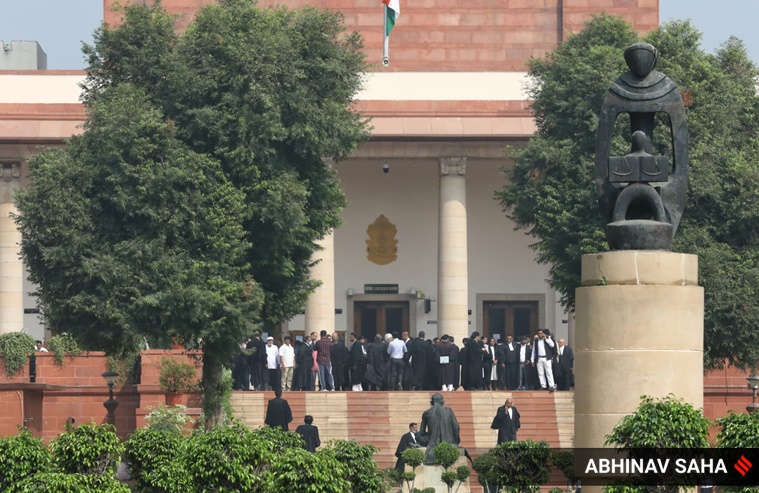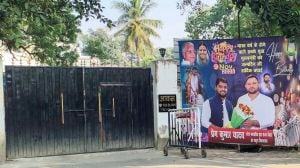The Constitutional amendment Bill to provide 10 per cent reservation in jobs and education to economically weaker sections (EWS) from the general category was supported by most parties in Parliament in January 2019. But there were concerns and reservations.
And the concerns raised by the parties mirrored the minority judgment on the issue in the Supreme Court on Monday.

The BJP government had tabled the Bill just months ahead of the 2019 general elections. The Opposition parties had accused the government of pushing the Bill “in haste” with an eye on elections and demanded that it be referred to a parliamentary panel for wider consultations and scrutiny. That criticism apart, most parties, barring the DMK, RJD, IUML and AIMIM, had backed it but raised some concerns.
Story continues below this ad
Opposition members had asked whether the Bill would stand judicial scrutiny as the Supreme Court had struck down P V Narasimha Rao government’s forward quota move in 1992. Many members asked the government to furnish the data based on which the 10 per cent figure was fixed.
 Lawyers gather as the Supreme Court pronounces the judgment on the EWS quota case. (Express Photo: Abhinav Saha)
Lawyers gather as the Supreme Court pronounces the judgment on the EWS quota case. (Express Photo: Abhinav Saha)
Then there was the question of exclusion of reserved categories from the EWS quota.
“A Dalit or an OBC who does not get a job within this quota still belongs to the EWS, but he is excluded… That is the Constitutional issue, which you have to answer. How have you excluded them, how have you excluded the poor, how have you excluded those who earn only 20,000 a month…who do not get jobs amongst the Dalits? That is the question you will have to answer,” Rajya Sabha member Kapil Sibal, who was then in the Congress, had said in the Upper House on January 9.
“When the Government talks about reservation for economically weaker sections, it means, already 49.5 per cent reservation is there for SC/ST and OBC…50.5 per cent is for open category… It is open even to SC/ST and OBC. And you are taking away 10 per cent from that open category,” CPI’s D Raja had said. “Reservation as a State policy has been conceived and accepted in order to provide affirmative action for the socially, educationally backward communities. And, reservation based on income criteria is against the legislative intent of the Constituent Assembly,” he added.
Story continues below this ad
RJD’s Manoj Jha had accused the government of tinkering with the “basic structure” of the Constitution. “Mandal came with voluminous documents. Where is the data for this? …You are basically testing the waters and this will pave the way for the removal of caste-based reservation. If you are so committed…then why are you scared to touch the private sector? Why are you silent on Dalits and Muslims?” he had asked.
DMK’s Kanimozhi recalled that the Supreme Court had in the Indra Sawhney case clearly stated that economic criteria should not be the basis for reservation. “The basic objective of reservation is to make sure that the historic wrong done in the name of religion and caste… has to be made right. It is not out of mercy… it is because they were born into a particular caste which some people thought was less than them, lower than them,” she had argued.
Congress’s Anand Sharma pointed out that the criteria set by the government — those who do not have more than 5 acres of land, do not own residential plot more than 1,000 square feet and earn less than Rs 8 lakh per annum — would make 98 per cent of people in the general category eligible for reservation.
Even while supporting the Bill, the CPM, too, had questioned the income criteria for the EWS quota. “The criteria to determine the beneficiaries…raise the question…whether the reservation will really benefit the deprived,” CPM’s Elamaram Kareem had asked.
Story continues below this ad
Samajwadi Party’s Ram Gopal Yadav had asked the government to raise the existing reservation cap for SC, OBC and minorities in line with their proportion in the population now since a decision has been taken to break the 50 per cent ceiling set by the top court. He and JD(U)’s Ram Chandra Prasad Singh asked the government to introduce reservation in the private sector as well.
The DMK and the AIADMK had opposed the Bill in the Rajya Sabha, but in the Lok Sabha, as many as 18 of the 23 parties, including the AIADMK, supported the Bill. Three parties—RJD, IUML and AIMIM— opposed it while the AAP and INLD did not take a clear stand.
Supporting the Bill, AIADMK’s M Thambidurai said “the country requires reservation for social justice. That is our party’s stand…however, reservation on economic grounds may not be feasible”. “Our demand is that the government should first make 69 per cent for the socially backward people because 90 per cent of the population is so. Therefore, the government should include all those castes in the list and increase the ambit of reservation from 50 to 70 per cent,” Thambidurai had said.
Backing the Bill, TMC’s Sudip Bandyopadhyay said: “The Trinamool Congress …extends support to the Bill with an expectation that the government will rise to the occasion and will take care of the unemployed youths of the country.”
Story continues below this ad
While supporting the Bill, TRS member A P Jithender Reddy said, “Coupled with possible violation of the ‘basic structure’ principle of the Indian Constitution, the list of legal hurdles is long. Yet, it is brave of the government to counter the Supreme Court’s cap of 50 per cent on reservation and the TRS reaffirms its endorsement.”
BJD member Bhartruhari Mahtab had supported the Bill. “While going through the Bill today, I found it very interesting and it needs to be supported in full measure …Whenever we move around in our constituency, we find that the Scs/STs/BCs are not the only poor, people who are from general category are also poor … they too need education and employment,” Mahtab had said.
Opposing the Bill, AIMIM member Asaduddin Owaisi did oppose the Bill, saying: “Why do I oppose the Bill? The first point is that this Bill is a fraud on the Constitution. Secondly, this Bill is an insult to Baba Saheb Ambedkar because the original purpose of the reservation was to give social justice, to reduce social and educational backwardness.”



 Lawyers gather as the Supreme Court pronounces the judgment on the EWS quota case. (Express Photo: Abhinav Saha)
Lawyers gather as the Supreme Court pronounces the judgment on the EWS quota case. (Express Photo: Abhinav Saha)





